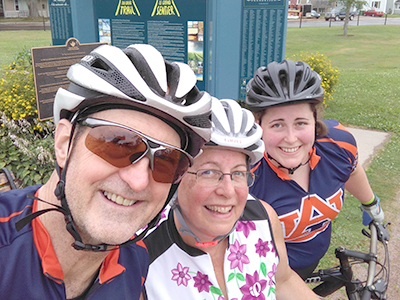
Researcher devotes both his personal and professional time to boosting the well being of men and families affected by the disease.
Few conditions affect more men than prostate cancer. Approximately one in seven Canadian men will develop the disease at some point during his lifetime, according to the Canadian Cancer Society. For around one in 29, a prostate cancer diagnosis will prove fatal.
This is something Dr. Michael Cox knows all too well. Earlier this year, he lost a good friend to the disease. This June 16, he will be participating in the Father’s Day Walk Run for Prostate Cancer to raise funds for Prostate Cancer Foundation BC in honour of his friend and in recognition of the countless others prostate cancer affects every day.

Cox sits on the Prostate Cancer Foundation BC board as a scientific advisor in addition to serving on the Prostate Cancer Canada's Research Advisory Council. However, his main focus is his work with the Vancouver Prostate Centre (VPC), where he is a senior research scientist.
Cox is one of the earliest team members at the VPC, having moved from Charlottesville, Virginia to Vancouver to set up his lab at VPC only three years after the centre was founded in 1997. Since then, his work has focused on identifying new approaches and possible treatments to improve the lives of men and families affected by prostate cancer.
A dedication to prostate cancer research and care
Cox’s most recently published paper—released in the journal Cancer Research in May 2019—found that a cholesterol-related protein called scavenger receptor B1 (SR-B1) could be partly responsible for prostate cancer growth and proliferation.
Cox’s research could lead to a new therapy that puts stress on cancer cells by destroying SR-B1, thereby stopping the growth and spread of prostate cancer.
Cox’s research also includes investigations into a genetic mutation that makes some men more vulnerable to developing prostate cancer. Called TMPRSS2-ERG, the genetic mutation is behind half of all prostate cancer diagnoses among Caucasian men, and around one third of diagnoses among African and Asian men, respectively. This research could lead to the development of a new medication that bypasses the need for hormone therapy—which is currently used to treat prostate cancer—among men with this genetic mutation.
“Hormone therapy blocks testosterone in men, which can lead to chest enlargement and tenderness, impotence, loss of libido and lethargy,” says Cox. “By precluding the need for hormone therapy, we would be saving men from these potentially life-altering side effects.”
"Something I always ask myself is: ‘How can we increase the quality of life of patients by reducing the burden of cancer?’”
On top of his clinical and research work, Cox is an avid road cyclist, often biking the 45-kilometre route from his home in South Surrey to the VPC offices at Vancouver General Hospital several times per week—a four-hour round trip!

Cox also volunteers a lot of his time to his research team, including mentoring postdoctoral fellows, and in the community. He conducts public outreach wherever possible to educate community members about the importance of prostate cancer screening, along with providing information about what resources and supports are available to men and their families after receiving a diagnosis.
“As the father of a son and daughter, and friend to many men, the research I do at VPC and in the community is foremost to me on a personal and professional level.”


